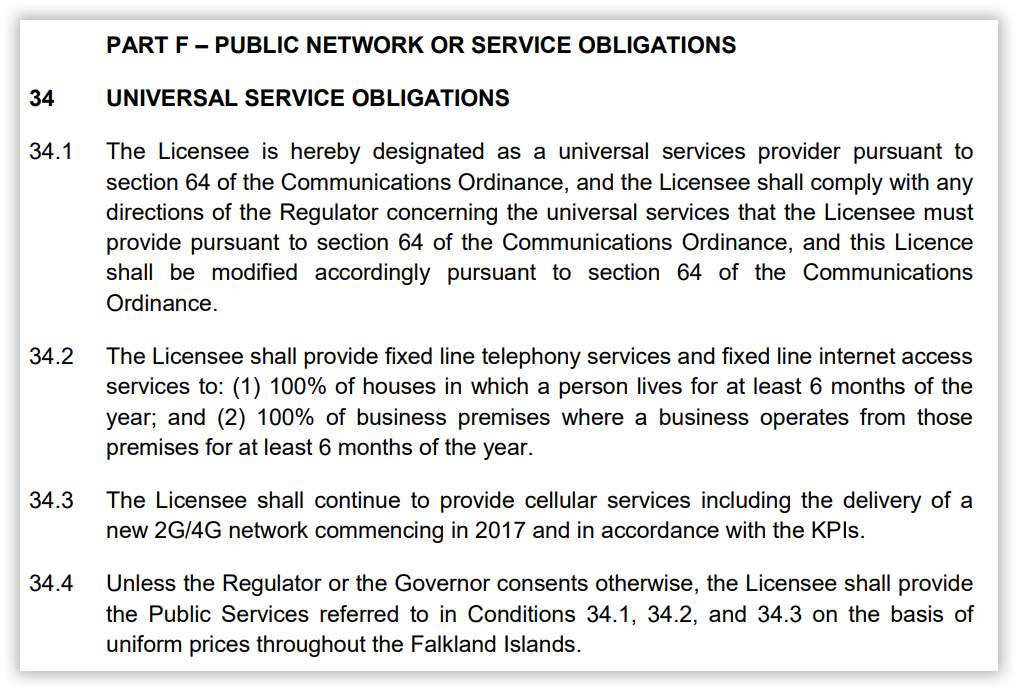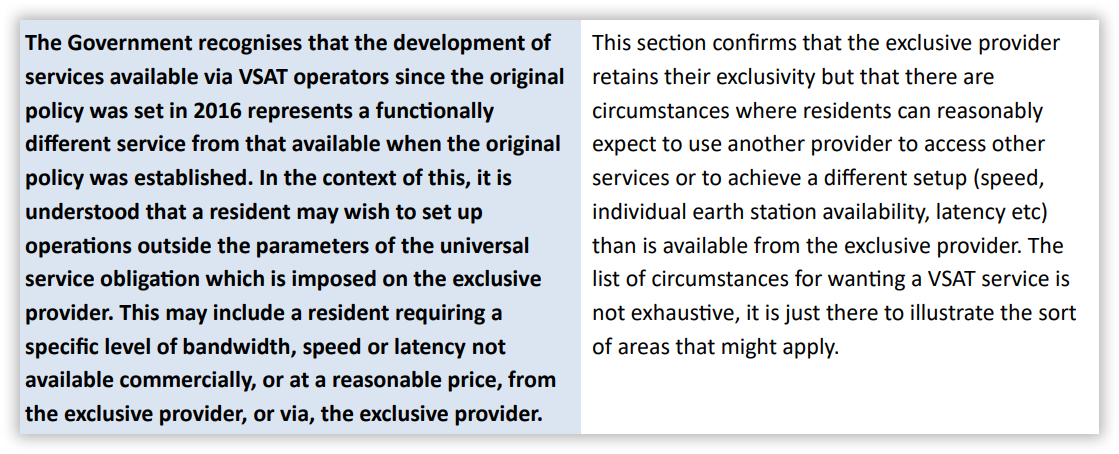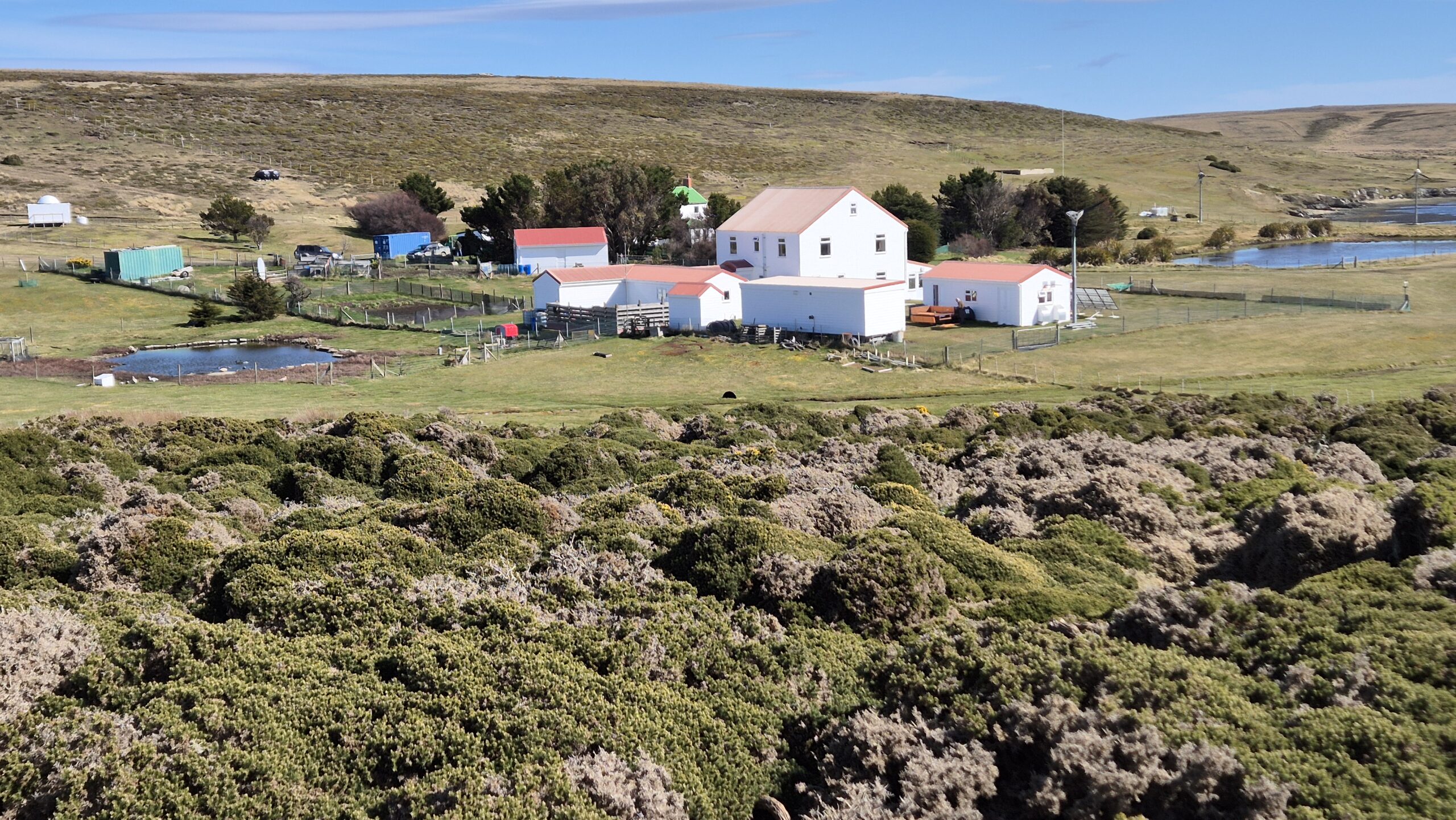
Parts I, II, and III of the Holding Islands Hostage series have extensively discussed the impact of an exclusive telecommunications licence in the Falklands, which expires on December 29, 2027. I suggest taking a look at these before proceeding to Part IV, if you haven’t already done so.
As the Falkland Islands Government (FIG) navigates a rapidly changing telecommunications landscape, especially in light of Starlink’s entry, concerns have been raised about the future of the Universal Service Obligation (USO) should Sure’s exclusive licence end or the company exit the market. This article explores whether such concerns are justified, explains what USO entails, and examines how its provision could evolve with 21st-century technologies. It concludes that while the delivery model for USOs will inevitably change, the obligation itself will remain a regulatory cornerstone and one that FIG will continue to enforce, regardless of which providers are involved. Islanders should focus on ensuring that future services are sustainable, equitable, and forward-looking, rather than preserving outdated models.
Let’s examine this supposed issue in greater depth, but first, what is are USOs?

What are Universal Service Obligations?
USOs in the FIG telecommunications licence are conditions that require Sure to provide basic services such as phone and internet to everyone in the country. This includes people in Camp, even if it’s not profitable for the company. The goal is to make sure everyone can access these essential services at a fair price and with reasonable quality.
Note: Camp is the rest of the Falklands’ geography outside of Stanley.
USOs focus on three main objectives: ensuring services are available in hard-to-reach areas, maintaining affordable prices for low-income users, and maintaining a minimum level of service quality. The rule also typically states that services must be provided fairly and without discrimination.
Governments may help offset the cost through subsidies or special funds, such as a Universal Service Fund, or companies might use profits from other areas to cover the expense. Overall, USOs aims to ensure that everyone, regardless of their location or financial situation, can access basic telecom services to stay connected and participate in the digital world. The exclusive licence with Sure, as would be expected, includes a USO statement.

What are Sure’s Individual licence USO conditions?
The need for USOs is specified in the 2017 Communications Bill:
“64 The exclusive licence must include provision requiring the exclusive licensee to comply with any obligations under regulations made by the Governor under this section (“Universal Service Regulations”).”
 Here are the USO conditions as specified in Sure’s Individual Operating Licence 2017,:
Here are the USO conditions as specified in Sure’s Individual Operating Licence 2017,:
It is also worth noting that there has never been a USO commitment to provide 100% coverage of a telecommunications service in the Falklands (as with FM radio). Indeed, in the 20th September Starlink Select Committee meeting, the Attorney stated the following:
“…there’s never been at any point agreement to full geographic coverage of the islands, and I doubt that that would be practical, and certainly not useful in economic terms, in relation to the capital and revenue investments to provide mobile coverage for the full geographic area.”
“…there are some places which are not occupied for more than six months
of the year, where there actually isn’t an obligation to provide any service, and there isn’t an obligation to provide it…”
There is also mention of USO exemption if they decide to take out a licence for VSAT usage:

The Sure USOs are straightforward, although their definition are somewhat shallow. Indeed, Clause 34.3 is meaningless from a practical objective perspective.

Sure’s stance regarding USO provision
What is Sure’s recent attitude to the provision of USOs? This can be understood in their submission to the Starlink Select Committee in August 2024:
“Sure’s exclusive Licence has meant that we have been able to continue to offer services to customers in the more remote areas of the Falkland Islands, which would otherwise be uneconomical to serve, as these customers can be cross subsidised from those customers located in easier to serve areas. This means that all customers can be charged the same price for their communications needs, regardless of any differences in the actual costs of providing service to different customers. That is, exclusivity has allowed Sure to meet its universal service obligations including the provision of access to basic services to all customers at reasonable and uniform prices, regardless of a customer’s location.”
“The increasing use of VSAT – which would be exacerbated under a lower or no licence fee approach – would undermine Sure’s ability to provide a full range of telecommunications services to all customers at affordable, uniform prices, and to do so regardless of how costly it is to provide services to individual customers due to their location.”
The obvious implication is that only through the provision of an exclusive licence is it possible for USOs to be met. This may have been true in 2017, but it is much less so in 2025.
Since FIG approved Starlink operation in the Falklands, Sure has maintained complete public silence on the matter, despite ongoing discussions with FIG. According to FIG’s 11th June 2025 press release:
“…FIG officers will now engage with Sure regarding ongoing provision of telecommunication services for the Falkland Islands. ExCo has requested a substantive update on negotiations with Sure in August [2025].”

Should islanders worry about losing USO provisions?
As outlined in FIG’s 2017 Communications Bill, USOs focused on basic fixed-line telephony and internet access will remain a core requirement, despite scaremongering, for any Falkland Islands’ operator’s licence in the foreseeable future, regardless of the service delivery model as discussed in Part III.
However, in the 21st century, the focus of USOs has shifted increasingly toward broadband internet access, especially in underserved rural and remote areas such as Camp in the Falklands. This shift reflects the global evolution of technology, particularly the growing reliance on Voice-over-IP (VoIP) services that have largely supplanted traditional telephony.
It is essential to recognise that USOs are undergoing substantial change worldwide, often accompanied by complex challenges. The Falklands will not be immune to these pressures. One of the most illustrative and contentious examples is the case of BT in the UK, which highlights both the opportunities and difficulties that come with redefining universal service in the digital age.

BT’s Digital Voice woes
In the UK, BT has experienced numerous issues switching customers to its new Digital Voice service, which utilises the Internet instead of traditional phone lines (although it still uses copper access lines).
BT’s website says “it’s our new home phone service, powered by your broadband connection
and comes with lots of features included like Call Protect and Voicemail.”
One significant issue is that Digital Voice doesn’t function during power outages unless a backup battery is present. This is a safety worry, especially for older people. BT is now giving some customers battery backups.
Many people didn’t understand what the change meant. They didn’t know they needed broadband or that their phones might need to be plugged into a router. This caused considerable confusion and more calls to BT’s help line.
Some older devices, like care alarms and fax machines, don’t work well with Digital Voice. BT had to help people find new options. In some places, especially in the countryside, the internet isn’t good enough for Digital Voice. BT had to delay the switch in those areas.
Groups such as Age UK and Ofcom were concerned about how the change would impact vulnerable individuals. As a result, BT paused the rollout and worked to improve the situation.
Another issue is that not everyone is accustomed to digital technology, particularly older individuals who may not have broadband access. BT didn’t support them well at first and had to do better.
It will probably be no different in the Falklands, as there’s no avoiding technological change, I’m afraid, as it’s the future. I sometimes doubt the technical paths that are being taken as well.

Delivering USOs with 21st-century technologies
Historically, the technology used to provide fixed-line voice services was WiMAX, a standard that was superseded by 4G LTE many years ago. Covering extensive geographies using terrestrial-based wireless technologies is extremely expensive, especially with the terrain encountered in the Falklands. Access for ongoing maintenance is also a significant issue. Should this expensive approach be continued in the future is a major question that needs to be asked.
Historically, the technology used to provide fixed-line voice and Internet in Camp was WiMAX. This wireless technology was introduced around 2010, allowing homes, settlements and farms to access basic broadband services without the need for underground cables. However, WiMAX has since been surpassed by more modern standards, such as 4G LTE. Today, Sure is currently upgrading the Fixed Wireless Access (FWA) network in Camp to LTE to (hopefully) improve speed and reliability.
Providing wide-area coverage using land-based wireless technologies, such as WiMAX or LTE, is extremely costly, particularly in challenging environments like the Falkland Islands. The islands’ rugged terrain, long distances between properties, and harsh weather make installation and ongoing maintenance very difficult. Technicians often have to travel overland or by air to reach remote equipment, which adds to the cost and complexity.
Modern USO frameworks are increasingly technology-agnostic. As technology advances, a key question for the Falklands is whether continuing to invest in these expensive wireless systems remains the best long-term solution. As global trends shift toward LEO satellite and other more scalable technologies, it’s essential to evaluate whether the current approach remains viable for the future needs of the islands.
However, we should not forget that Starlink will not replace all terrestrial communication infrastructure, and that 4G mobile services will remain in place for many years to come.
Fixed-line USOs have mainly become obsolete in many countries as voice and messaging services have migrated to the Internet, but they will certainly not disappear.
With the advent of Starlink, as well as the emergence of other LEO constellations and direct voice mobile-to-satellite services, it is certain that terrestrial-based voice and Internet connectivity to remote farms, such as those currently deployed in Camp, will be replaced mainly by space-based LEO technologies. Even Sure has acknowledged this. Of course, this does not apply to larger Camp settlements such as Fox Bay, Port Howard, Goose Green, etc.

USOs and Starlink (or OneWeb come to that)
With Starlink offering high-speed broadband in both Stanley and Camp, USOs can still be upheld but in a different way. Modern USOs are less about how services are delivered and more about ensuring everyone has access to reliable, affordable internet and phone connectivity. Even with satellite-based solutions, FIG can implement rules to guarantee good service across all areas, including remote locations.
FIG could require Starlink, or a local company acting as its reseller (such as a ServCo?) to comply with local regulations. These could include price controls, customer support standards, and a requirement to maintain pricing parity between Stanley and Camp users. It’s important to note that, like Sure’s broadband and most global internet services, satellite services are “best effort.” Therefore, enforcing download speeds through key performance indicators (KPIs) are not feasible.
A practical model would be for ServCo to act as a Starlink reseller, taking responsibility for meeting USO requirements, supporting customers, and maintaining fair pricing. Similar arrangements are already in place in remote areas like Alaska and various Pacific islands.
In short, USOs remain relevant even as technology evolves. The introduction of Starlink doesn’t eliminate FIG’s responsibility or power to ensure equitable internet access. The focus should shift from legacy infrastructure to user needs. With thoughtful regulation and partnerships, USOs can continue to function effectively where LEO satellite-based services are an integral part of a connected Falklands.
It’s worth noting that Sure has also proposed offering its own low-earth-orbit (LEO) solution via OneWeb to Camp users so that the same regulatory principles would apply there as well.

Conclusions
USOs have long played a central role in ensuring that all Falkland Islanders, especially those living in Camp, have access to essential telecommunications services. For years, this obligation has been fulfilled under Sure’s exclusive licence, made possible through cross-subsidisation according to Sure. However, as technology evolves and global markets shift, the future of USO delivery in the Falklands must be reconsidered.

The rollout of new technologies, such as the growing presence of LEO satellite services like Starlink and voice-to-satellite services, is dramatically reshaping what is possible and affordable in terms of Camp connectivity. We must recognise that traditional models of terrestrial-based service delivery, while historically effective, are becoming increasingly expensive and difficult to maintain. The reality is that modern USO frameworks are now moving away from specific technologies and instead focusing on outcomes: reliable, affordable, and universally available digital services, however they are delivered.
Also, we must not overlook the fact that the telecommunications monopoly on the islands has stifled innovation, as evidenced by Stanley’s outdated ADSL infrastructure. Regulation alone cannot fix this; it merely monitors whether Sure is in breach of the law, rather than driving progress.
Looking ahead, it’s essential that Falkland Islanders are not misled into fearing the loss of USOs simply because the exclusive licence may end or new providers enter the market. FIG will still have the regulatory authority and responsibility to define USO requirements in any future licensing or competitive framework. What matters most is that those obligations evolve with the times and ensure service delivery is both sustainable and future-proof.
The future of USOs in the Falklands does not depend on holding onto the past. It depends on making smart, forward-looking decisions about how best to deliver services to all residents, especially those in Camp, in the most cost-effective, resilient, and modern way possible. In fact, with some effort, USO commitments could significantly improve in the coming years!
Most importantly, it does not depend on extending exclusive telecommunications licences into the 2030s and beyond to achieve meaningful, workable and effective USOs.

Chris Gare, OpenFalklands, July 2025, copyright OpenFalklands


